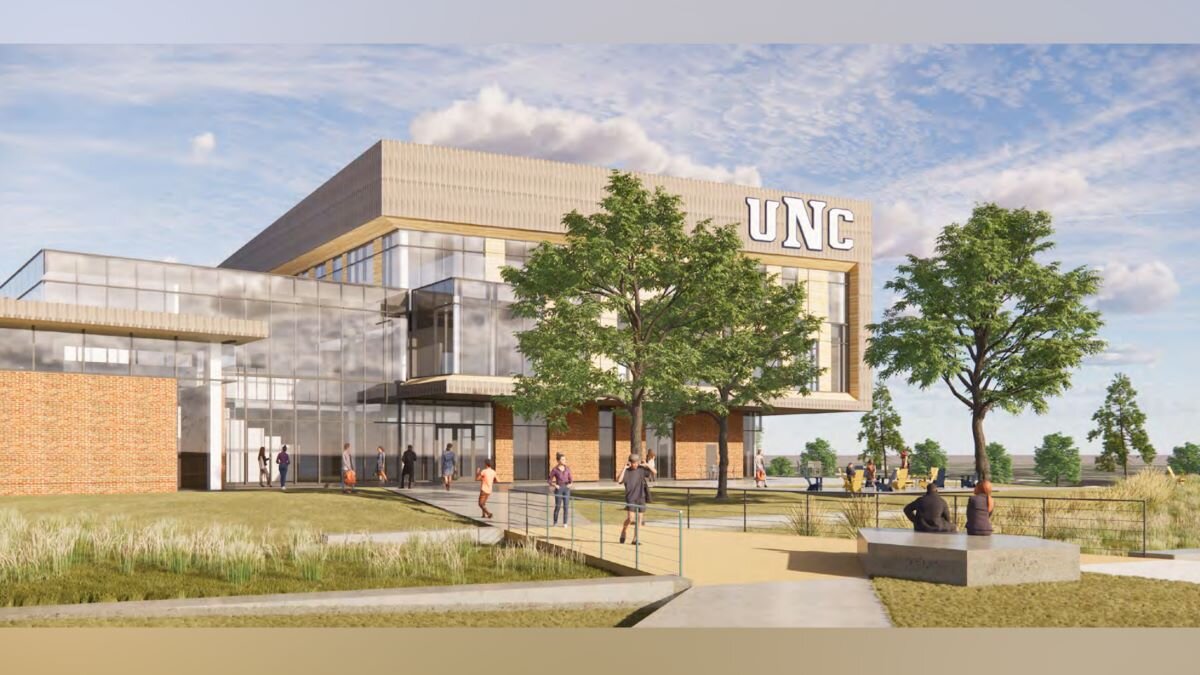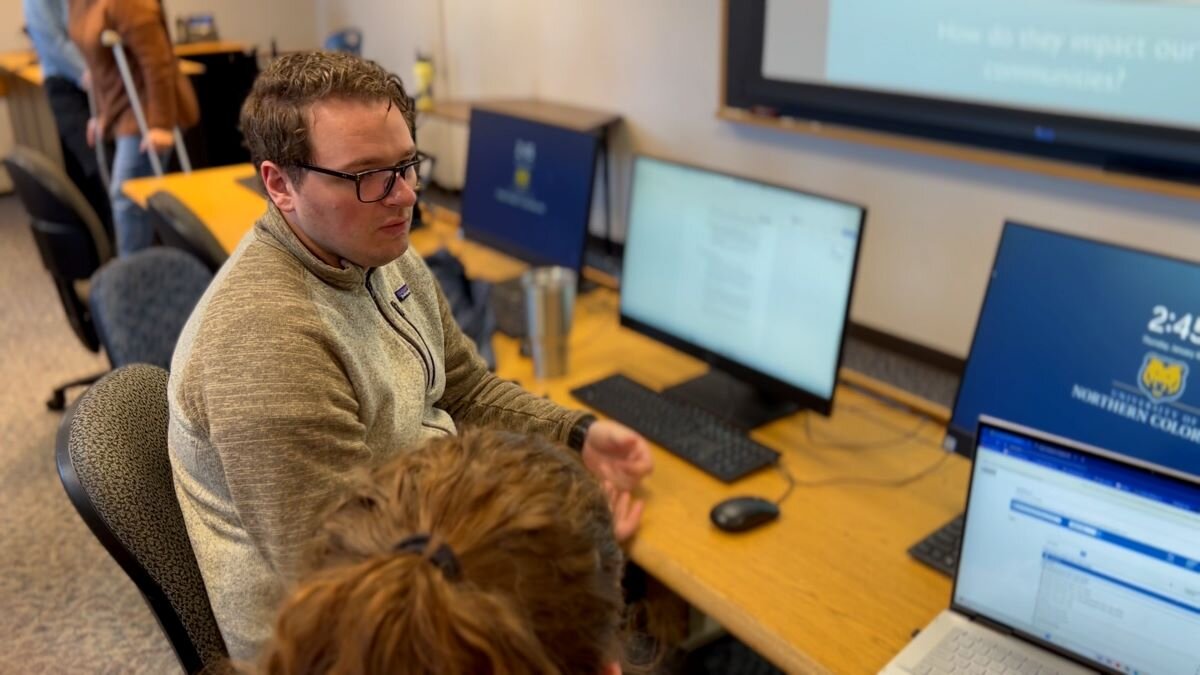University of Northern Colorado hopes to train the next generation of osteopaths with new school

GREELEY, Colo. — The University of Northern Colorado hopes to fill the physician gap in the state by training a new group of doctors with its proposed College of Osteopathic Medicine, which officials say could open as soon as 2026.
“It’s something we’ve been working on for over three years,” UNC President Andrew Feinstein said of the plan for the new medical school.
“And to make this a reality, it will have significant impacts for Colorado, Weld County and of course Greeley,” he said.
UNC needs to raise approximately $170 million to establish the school. Just over $127 million of that total would go toward construction costs for a new facility on the Greeley campus and about $42 million would go into an escrow account required by the Commission on Osteopathic College Accreditation to meet accreditation obligations.
Practicing medicine through a “whole person” approach is something Beth Longenecker, a Doctor of Osteopathic Medicine (DO) and the founding dean for the University of Northern Colorado’s proposed College of Osteopathic Medicine, hopes to bring to the state.
Longenecker said many internal and outside factors contribute to a patient’s pain other than sickness itself, such as socioeconomic status and family issues.
While MDs (doctors of medicine) focus on treating symptoms and diseases with medications, surgery and conventional medical practices, doctors of osteopathic medicine (DOs) focus on a more holistic approach, she said.
This means considering the patient’s overall well-being and the use of osteopathic manipulative treatment (OMT), which involves hands-on techniques, to diagnose and treat conditions.
“There are MDs who really follow [osteopathic philosophy], but that is the tenet of [a DOs] very being,” Longenecker said.
“We incorporate that in our curriculum in the hopes that our doctors are going to graduate and be that whole-centered, patient-centered person,” she said.
Construction of the school is estimated to be completed in 2026, with an expected enrollment of 600 students, according to Feinstein. The college will be built on the Bishop Lehr campus.

Image of what the new College of Osteopathic Medicine will potentially look like.
Photo: UNC.
Currently, the only school in the state with an osteopathy program is the Rocky Vista University College of Osteopathic Medicine in Parker.
Longenecker’s passion for caring for others comes from her father, who was a DO. She lives by the philosophy of A.T. Still, the MD who started osteopathic medicine in 1828.
“[A.T. Still] looked at medicine in the way it was being practiced and said, ‘You know, there is some things missing’,” Longenecker said.
“And [Still’s] philosophy was that you have to look at people as a unit, and that unit is their mind, body, and spirit,” she said.
Today, DOs face stigmas that MDs do not.
Dr. Daniel Lopez, DO, runs Inspire Osteopathy Denver with his wife, Sarah Curtis, DO. Lopez said that, because osteopathic medicine is not as well known, the public views osteopaths as lesser than that of MDs.
“I think a lot of people don’t understand that [MDs and DOs] are equal in the United States,” said Lopez.
Both DOs and MDs go through four years of medical school training and residency. The main difference between the two disciplines is their approach to patient care.
Lopez describes his DO works as a detective finding the source of his patient’s pain.
“You have to be able to read what the body is telling you with your hands,” he said.
“It’s like a form of communication when you can put the hands on the body and understand what it’s trying to tell you and come up with a plan to try and help the patient.”
Although the American Association of Colleges of Osteopathic Medicine reports a 77 percent increase in osteopathic medical students in the last decade, Colorado and nationwide are experiencing low numbers of medical workers.
Las year, the Association of American Medical Colleges reported the U.S. will face a medical workforce shortage of between 37,800 and 124,000 by 2023, the last year for which workforce statistics were available.
“Any of the students that we interview I want to hear that they want to help people, that is the underlying need to become a physician otherwise you will burn out because It’s a lot of work, it’s a lot of years, its long hours,” Longenecker said.
“And you really have to be driven by that desire to serve and help others,” she said.
Charlie Johnston, 30, currently a senior studying public health at UNC, hopes to be in the first class at the Osteopathy school.

Charlie Johnston in class.
Photo: Lindsey Ford, Rocky Mountain PBS
Johnston said there are several reasons why people pursue medicine, one is they usually have a chip on their shoulder, or they want to help people.
“For me obviously, I do want to help people,” Johnston said.
“I want a goal and a career that I can work on. That, at the end of the day, I don’t care about the money necessarily, I’d rather just do something that I feel satisfied with. That I feel I’m doing my best giving back to the people around me,” he said.
Johnston said his experience with COVID-19 attracted him to the philosophy behind osteopathic medicine rather than becoming an MD. He was hospitalized for ten days during the pandemic and learned he had to advocate for himself, even recommending medications to the doctors who cared for him.
He said that he would not be alive today if he hadn’t spoken up.
“Getting told you have no options or very few options is really unnerving to hear from the experts, the people you go to for an emergency,” said Johnston.
Although the experience was frightening for him, it broadened Johnston’s perspective on how to treat patients.
“I never want to be able to do that to someone. I want to go into medicine so that I can avoid that happening to someone else,” he said.
Lindsey Ford is a multimedia journalist with Rocky Mountain PBS. lindseyford@rmpbs.org.